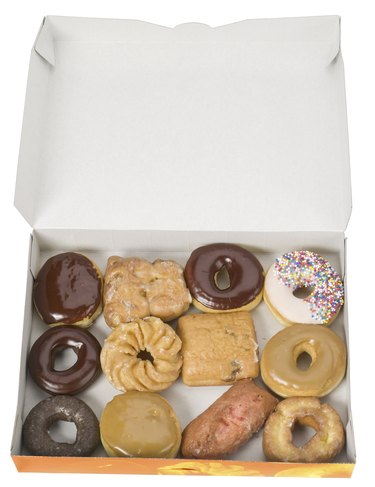
Your gallbladder is a sac-like organ beneath your liver that stores a liver secretion called bile. The main health problems involving this organ include painful accumulations of hardened bile, called gallstones, and a form of inflammation called cholecystitis. Worsening of these problems is typically associated with fat consumption, not sugar consumption. However, lowering your intake of sugar and other refined foods may help reduce your gallbladder-related symptoms.
Background
Video of the Day
Your liver makes bile from a combination of water, fats, cholesterol, proteins, a waste product called bilirubin and substances called bile salts. After it's made, bile passes from your liver to your gallbladder through a connection called a bile duct. When you eat, bile flows from your gallbladder to your small intestine, where bile salts help break down the fat content of your food. Gallstones typically form when your bile contains too much bilirubin or cholesterol, or too many bile salts. You can also develop gallstones if your gallbladder doesn't empty fully or relatively frequently. Potential causes of cholecystitis include gallstones, infection, tumors and physical injury of the gallbladder.
Video of the Day
Fat and Gallstones
If you eat a diet that's high in fat and cholesterol, and simultaneously low in fiber, you have an increased risk of developing gallstones, according to the National Digestive Diseases Information Clearinghouse. If you have gallstones, you can experience pain symptoms following any meal. Consumption of a high-fat meal, in particular, raises your risks for a gallstone attack. Additional diet-related factors in the onset of gallstones include having overweight or obesity, losing a lot of weight in a short period of time and fasting.
Fat and Cholecystitis
You can develop one of two forms of cholecystitis: acute, short-term cholecystitis, or chronic, long-term cholecystitis. Roughly 95 percent of people with acute cholecystitis have gallstones, the "Merck Manual Home Health Handbook" explains. Almost all chronic cases of cholecystitis also stem from the presence of gallstones. Since consumption of high-fat foods can trigger gallstone attacks, by logical extension, consumption of these same foods can worsen cases of both acute and chronic cholecystitis.
Sugar and Other Considerations
The University of Maryland Medical Center lists a number of diet-related steps that can potentially reduce the symptoms of gallbladder problems. In addition to reducing your intake of sugar, pasta and white bread, reduce your intake of red meat, increase your intake of fiber and antioxidant fruits and vegetables, avoid alcohol consumption, use olive oil and other vegetable oil for cooking and avoid any food cooked with trans fat. Common trans-fat containing foods include donuts and other commercial baked goods, processed foods, French fries, onion rings and margarine. Consult your doctor for more information on the relationship between gallbladder problems and the consumption of fat and sugar.